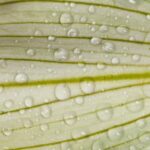In recent years, there has been a growing interest in natural pest control methods in vegetable gardens. Gardeners are increasingly seeking alternatives to chemical pesticides, looking for safer and more eco-friendly solutions. One such solution that has gained attention is cedar oil. The question of “is cedar oil safe for vegetable gardens” is a common one among those exploring natural pest control options.
Cedar oil is derived from the wood, needles, and roots of various types of cedar trees. It has been used for centuries for its aromatic properties and as a natural insect repellent.
In the context of gardening, cedar oil is being considered as a potential solution for controlling pests without resorting to harmful chemicals. However, before delving into the details of how cedar oil can be used effectively in vegetable gardens, it’s essential to understand what cedar oil is and its properties.
Cedar oil offers numerous benefits when used in vegetable gardens. Its natural properties make it an effective deterrent against pests and insects without posing significant harm to plants or beneficial insects.
With its potential to repel unwanted visitors, cedar oil has become an attractive option for gardeners looking to maintain the health and integrity of their vegetable gardens without relying on synthetic pesticides. However, while there are clear advantages to using cedar oil, it’s important to consider any concerns or potential drawbacks associated with its application in garden settings before deciding whether it is the right choice for your vegetable garden.
What Is Cedar Oil?
Cedar oil is a natural essential oil derived from various types of cedar trees. It has been used for centuries for its aromatic and medicinal properties, and more recently, it has gained attention for its potential use in gardening and pest control. Cedar oil contains compounds that are known to repel insects, making it an attractive option for those seeking natural solutions to protect their vegetable gardens from pests.
One of the key components of cedar oil is cedrol, a substance that has been found to be effective in repelling and controlling a wide range of pests, including mosquitoes, ants, and moths. Additionally, cedar oil is also known for its antibacterial and antifungal properties, which can help protect vegetable plants from diseases and other microbial threats.
When used in gardening, cedar oil can be applied directly to the soil or as a foliar spray. Its natural repellent properties make it an effective alternative to synthetic pesticides, especially for those looking to minimize their impact on the environment and reduce their exposure to potentially harmful chemicals.
| Benefit | Detail |
|---|---|
| Active Component | Cedrol |
| Properties | Antibacterial and Antifungal |
| Application Methods | Soil application or foliar spray |
Benefits of Cedar Oil in Vegetable Gardens
Effective Pest Control
Cedar oil has been proven to be an effective natural pest control method in vegetable gardens. It acts as a repellent for a wide range of pests and insects, including ants, moths, mosquitoes, and ticks. This can help protect the vegetable garden from potential damage caused by these pests, allowing for healthy and thriving plant growth. Additionally, cedar oil is safe to use around children and pets, making it an ideal choice for families with concerns about chemical insecticides.
Non-Toxic Solution
One of the key benefits of using cedar oil in vegetable gardens is its non-toxic nature. Unlike traditional chemical pesticides, cedar oil does not leave harmful residues on the plants or in the soil.
This makes it a safer option for organic gardening and reduces the risk of exposure to potentially harmful chemicals for both humans and wildlife. By choosing cedar oil as a pest control method, gardeners can maintain a healthy and environmentally friendly growing environment for their vegetables.
Natural Fragrance
In addition to its pest-repelling properties, cedar oil also emits a pleasant natural fragrance that can enhance the overall gardening experience. The aroma of cedar oil deters pests while providing a refreshing scent in the garden space. This can create a more enjoyable atmosphere for gardeners while working in the vegetable garden. Furthermore, the natural fragrance of cedar oil can contribute to creating a balanced ecosystem by attracting beneficial insects such as bees and butterflies.
Overall, the benefits of using cedar oil in vegetable gardens make it a compelling choice for those seeking natural and eco-friendly pest control solutions. From its effectiveness in repelling pests to its non-toxic nature and pleasant fragrance, cedar oil offers numerous advantages for maintaining a healthy and thriving vegetable garden environment.
Concerns and Considerations
When considering the use of cedar oil in vegetable gardens as a natural pest control method, it’s important to address any potential drawbacks or concerns associated with this approach. While cedar oil is generally considered safe and effective, there are some considerations that gardeners should keep in mind before using it in their garden.
Impact on Beneficial Insects and Other Plants
One of the main concerns about using cedar oil in vegetable gardens is its potential impact on beneficial insects and other plants. While cedar oil is known for repelling pests, it may also affect beneficial insects such as bees and butterflies, which are crucial for pollination. Additionally, some plants may be sensitive to cedar oil, so it’s essential to consider how its use may affect the overall ecosystem of the garden.
Residue and Persistence
Another consideration when using cedar oil in vegetable gardens is its residue and persistence in the environment. Cedar oil can leave a residue on plant surfaces, which may affect the taste or quality of vegetables. Additionally, its persistence in the soil and water may have unintended consequences for other organisms in the garden ecosystem. It’s important to follow proper application guidelines and consider the environmental impact of using cedar oil.
Regulatory Considerations
Lastly, gardeners should be aware of any regulatory considerations related to the use of cedar oil in vegetable gardens. Depending on local regulations and guidelines, there may be restrictions or specific requirements for using cedar oil as a pest control method. It’s essential to research any legal considerations and ensure compliance with relevant laws and regulations when incorporating cedar oil into gardening practices.
How to Use Cedar Oil in Vegetable Gardens
Cedar oil can be an effective natural pest control method in vegetable gardens when used properly. There are several ways to use cedar oil to keep pests at bay and protect your precious plants. Here are some key steps and considerations for using cedar oil in your vegetable garden:
- Choose the Right Product: Look for a high-quality cedar oil product specifically designed for use in gardens. Make sure to read the label and follow the manufacturer’s instructions carefully.
- Application Methods: Cedar oil can be applied as a spray, through a misting system, or by using granules or sachets. Determine the best method for your garden based on the type of pests you’re dealing with and the size of your garden.
- Targeted Areas: Focus on areas where pests are most likely to gather, such as around the base of plants, along garden borders, and near entry points where pests may enter the garden.
It’s important to note that while cedar oil can be effective in repelling certain pests, it may not eliminate all types of insects or critters. Combining cedar oil with other natural pest control methods, such as companion planting or beneficial insect attraction, can enhance its effectiveness and provide comprehensive protection for your vegetable garden.
When using cedar oil in your vegetable garden, it’s essential to follow safety guidelines to ensure that you are protecting yourself, your plants, and the environment.
Remember to always consult with a gardening expert or professional before introducing any new pest control methods into your vegetable garden. By following best practices and using cedar oil responsibly, you can help maintain a healthy and thriving garden while minimizing the presence of unwanted pests.
Safety and Environmental Impact
Cedar oil is a natural solution that many gardeners turn to for pest control in their vegetable gardens. Derived from the cedar tree, this essential oil has gained popularity for its effectiveness in repelling pests and insects without the use of harmful chemicals. However, before using cedar oil in your vegetable garden, it is important to consider its safety and environmental impact.
Safety
When used properly, cedar oil is considered safe for humans and pets. It is a natural product and does not contain synthetic or toxic ingredients commonly found in conventional pesticides. However, it is still important to take precautions when handling cedar oil to avoid any potential skin or eye irritation. Always read the label instructions carefully and wear protective gear such as gloves and goggles when applying cedar oil in the garden.
Environmental Impact
One of the main benefits of using cedar oil in vegetable gardens is its minimal impact on the environment. Unlike chemical pesticides, cedar oil does not leave behind harmful residues that can contaminate soil or water sources. Additionally, it does not pose a threat to non-target organisms such as bees and other beneficial insects. When used responsibly, cedar oil can be an environmentally friendly option for pest control in vegetable gardens.
Considerations
While cedar oil is generally safe for use in vegetable gardens, some considerations should be kept in mind. It is important to use cedar oil sparingly and only as needed to minimize any potential impact on the environment.
Additionally, if you have specific concerns about using cedar oil around certain plant species or beneficial insects, it may be best to explore alternative pest control methods that better suit your garden’s unique needs. Always conduct thorough research and consider consulting with a professional before introducing any new product into your garden ecosystem.
Alternatives to Cedar Oil
When it comes to natural pest control methods in vegetable gardens, cedar oil is just one of many options available to gardeners. For those who may have concerns about using cedar oil or are looking for alternative solutions, there are several other natural pest control methods worth considering. These alternatives offer different approaches to managing pests in vegetable gardens and may be more suitable for some gardeners based on their specific needs and preferences.
One popular alternative to cedar oil is neem oil, which is derived from the seeds of the neem tree. Neem oil has been used for centuries as a natural insect repellent and can be effective in controlling a wide range of garden pests, including aphids, caterpillars, and beetles. It works by disrupting the insect’s hormonal balance and can also act as a deterrent for future infestations.
Another natural pest control method to consider is diatomaceous earth, which is made from fossilized remains of marine phytoplankton. When sprinkled around plants or on the soil surface, diatomaceous earth acts as a mechanical insecticide, causing dehydration and death to many common garden pests like slugs, snails, and ants. It is important to note that diatomaceous earth should be used sparingly and with caution as it can also harm beneficial insects if not applied properly.
For those looking for a more hands-on approach to pest control, introducing beneficial insects such as ladybugs or lacewings into the garden can help manage pest populations naturally. These predatory insects feed on common garden pests like aphids and mites, providing an environmentally friendly way to keep pest populations in check without the use of chemical pesticides or oils.
With these alternatives in mind, it’s important for each gardener to carefully consider their specific needs and preferences when choosing a natural pest control method for their vegetable garden.
Conclusion
In conclusion, while cedar oil shows promise as a natural pest control method for vegetable gardens, it is important for gardeners to weigh the benefits against the potential concerns and considerations. The use of cedar oil can effectively repel pests and insects, contributing to a healthier and thriving garden.
However, there are also concerns about its impact on beneficial insects and other plants in the ecosystem. Therefore, it is crucial for gardeners to carefully consider the potential drawbacks before incorporating cedar oil into their gardening practices.
Additionally, when using cedar oil in vegetable gardens, it is essential to follow proper application instructions to ensure its effectiveness and safety. Gardeners should be mindful of the dos and don’ts of using cedar oil for pest control, as well as its environmental impact. While cedar oil is considered safe for use in gardens, it is advisable to seek guidance from professionals and experts in the field of organic gardening to make informed decisions.
In exploring alternatives to cedar oil, gardeners have the opportunity to consider other natural pest control methods that may be equally effective and less concerning in terms of their impact on beneficial insects and plants. By comparing different alternatives, individuals can make informed choices that align with their values of sustainable and eco-friendly gardening practices. Ultimately, the decision to use cedar oil or explore other options depends on individual preferences and priorities for maintaining a healthy vegetable garden.
Frequently Asked Questions
Is Cedar Oil Food Safe?
Cedar oil is generally considered safe for food when used in small amounts as a flavoring or preservative. However, it’s important to ensure that the cedar oil you use is labeled as food-grade and safe for consumption.
Some cedar oils may contain additives or chemicals that are not safe for ingestion, so it’s crucial to read the product label carefully.
Is Cedarwood Oil Safe for Plants?
Cedarwood oil can be safe for plants when used properly and in appropriate concentrations. It is commonly used as a natural insect repellent and fungicide in gardens. However, it’s important to dilute the cedarwood oil with water or a carrier oil before applying it to plants, as using pure cedarwood oil can potentially harm or burn the plant leaves.
How Do I Use Cedarwood Oil in My Garden?
Cedarwood oil can be used in the garden in various ways to repel insects, ward off fungal diseases, and even promote relaxation for both plants and gardeners. To use cedarwood oil in your garden, you can create a natural insect spray by diluting it with water and a bit of liquid soap, apply it directly to the soil to deter pests, or diffuse it near your garden area to help create a soothing atmosphere while working outdoors.
Always follow any specific instructions on the product label for application methods and proper dosage.

If you’re looking to get into vegetable gardening, or are just looking for some tips on how to make your current garden better, then you’ve come to the right place! My name is Ethel and I have been gardening for years. In this blog, I’m going to share with you some of my best tips on how to create a successful vegetable garden.





